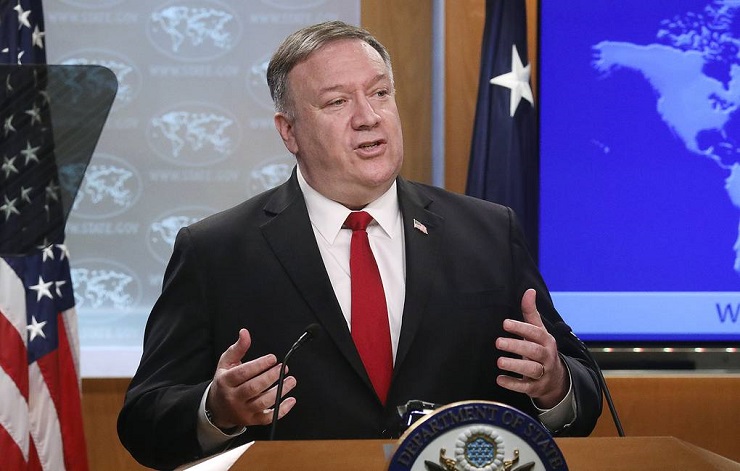Since particularly the outbreak of COVID-19 pandemic, a sea change in the US policies vis-à-vis China has taken place. Its latest manifestation came on July 23 when the US secretary of state, Mike Pompeo, delivered what has been called the American “Iron curtain” speech. Pompeo’s “Communist China and the Free World’s Future” speech does provide a significant insight into how the US is trying to establish a ‘new cold war’ global politics whereby it can place itself once again as the leader of the ‘free world’ against China, the so-called epitome of “threat” to America—its unilateral supremacy, its hegemonic domination of the world politics since the disintegration of the Soviet Union and its increasing tilt towards sabotaging multilateral agreements, such as the Iran nuclear deal, to extend its own and those of its allies’ supremacy, even if it comes at the expense of peace. Pompeo’s speech does show that the US is projecting China as an ‘evil power’ that needs to be countered. To quote him:
“If we bend the knee now, our children’s children may be at the mercy of the Chinese Communist Party, whose actions are the primary challenge today in the free world. General Secretary Xi is not destined to tyrannise inside and outside of China forever, unless we allow it. Now, this isn’t about containment. Don’t buy that. It’s about a complex new challenge that we’ve never faced before. The USSR was closed off from the free world. Communist China is already within our borders. So we can’t face this challenge alone. The United Nations, NATO, the G7 countries, the G20, our combined economic, diplomatic, and military power is surely enough to meet this challenge if we direct it clearly and with great courage.”
However, while Pompeo refused to call it “containment”, the ‘new cold war’ strategy is more of a roll back of China from the US and Europe. Simply put, the US is selling the ‘decoupling’ mantra to its allies both in Europe and elsewhere. This is how the US aims to regain the leadership position it has lost in last few years. Accordingly, while ‘decoupling’ from China is important, it is only “America”, which “is perfectly positioned to lead” this endeavour, argued Pompeo.
But the question is: how well is the US’ ‘new cold war’ rhetoric being received? As Pompeo himself said, the US alone cannot achieve this objective. The US allies, however, seem to have an all together different mindset when it comes to defining their relations with China. To the US’ dismay, not many of the allies, even if their relations with China are not typically ‘friendly’, think that following the US in its footsteps is a good idea. Not many of them seem to believe that a ‘new cold war’ is required to first de-couple and then contain China.
This was particularly evident when the Australian foreign minister Marise Payne recently visited the US even as the pandemic is truly raging there. While the minister did say that they have differences with China, Australia, like the US, has a its own position vis-à-vis China. As the minister, standing alongside Pompeo, explained further, their position is far from a potential or even real decoupling. In fact, it is that of engagement. To quote her:
“But most importantly from our perspective, we make our own decisions, our own judgments in the Australian national interest and about upholding our security, our prosperity, and our values. “So we deal with China in the same way. We have a strong economic engagement, other engagement, and it works in the interests of both countries.”
Adding further, the minister said,
“As my prime minister put it recently, the relationship that we have with China is important, and we have no intention of injuring it.”
While the US would have obviously wanted to enlist Australian support to counter China in the Pacific, Europe, too, is not particularly enthusiastic about the US’ ‘new cold war.’ In fact, US-Europe relations are already becoming too fragile to tackle what Pompeo called ‘a new challenge.’
How integral fragility is to the US-Europe relations is evident from the US decision to cut the size of its troops from Germany, a country which is not only no longer on good terms with the US, but also is actively seeking to cultivate China as a reliable economic partner for Europe. Indeed, Germany and Chinese leadership have established a frequency of contact that even the US does not have with Europe.
Even the UK, despite its on-going tensions with China over Hong Kong and its decision to roll back Chinese 5G , is not in line with US thinking on a grand strategy and a grand alliance vis-a-China. Indeed, when the UK’s foreign secretary recently framed China policy in his July 20 speech to the House of Commons, he emphasised cooperation over confrontation, saying “We want to work with China. There is enormous scope for positive, constructive, engagement. There are wide-ranging opportunities, from increasing trade, to cooperation in tackling climate change.”
The US effort, therefore, to create a new iron curtain is highly unlikely to attract any bidders, ready to jump on the bandwagon, from Europe or elsewhere. Significantly enough, if Europe continues to maintain a calculated distance with the US over its China policies, other US allies, such as Australia, too will feel encouraged to chart an independent course of action.
Salman Rafi Sheikh, research-analyst of International Relations and Pakistan’s foreign and domestic affairs, exclusively for the online magazine “New Eastern Outlook”
